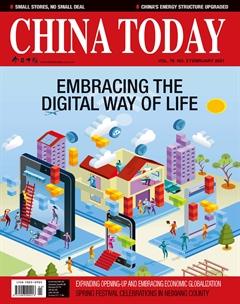Life in the Cloud
Amid the raging COVID-19 pandemic, buzzwords like online courses, working from home, online shopping, and smart cities are reshaping peoples lives. Although it has dealt a heavy blow to the global economy, the pandemic is accelerating the digitalization of the consumer-oriented service sector.
The European Union unveiled the Digital Services Act and Digital Markets Act on December 15, 2020, to better regulate the digital sector. Technology has upended peoples lives, work, and consumption trends, and is pushing digital transformation of traditional industries and spawning new rounds of technological competition.
An article published by UNESCO on December 16, 2020, stated, “The COVID-19 pandemic has created the most severe disruption to global education systems in history, forcing more than 1.6 million learners in over 190 countries out of school at the peak of the crisis.”
Online teaching is an important way to ensure education continuity. Statistics released at the 2020 Global MOOC Conference held in Beijing on December 12, showed that China ranked first in the world in terms of the creation and application of MOOCs (Massive Open Online Courses). The number of MOOCs available had surpassed 34,000 in China, and as many as 540 million Chinese have used the online resource.
The pandemic also gave birth to new business models to satisfy new demands as more people now work from home. Twitter was the first U.S. tech giant to allow its employees to work from home permanently. Later, Facebook, Google, and Microsoft among other major U.S. tech companies announced support for longterm work-from-home. According to The Washington Post, some Americans may never resume working in an office again.
Not surprisingly, working remotely cannot be divorced from intelligent office equipment. Statistics showed that since 2014, the market valuation of the smart office sector in China has stayed above RMB 100 billion. China is also emerging as the largest office-sharing market, the potential of which is estimated to reach RMB 409 billion by 2022. The tourism sector is also explor- ing possibilities by combining the work-from-home trend with vacation packages.
During the pandemic, online shopping and food delivery have become mainstream. The sales of gaming laptops and laptop computers surged 134.3 percent and 67.4 percent year-on-year respectively during the three-day New Year holiday on JD.com, a major Chinese online shopping platform. The sales of instant food and snacks rose 67.5 percent and 63.2 percent respectively on the platform. E-commerce platforms have become an indispensable service for urban dwellers. Based on big data, artificial intelligence, and other technologies, they are facilitating the transformation of the consumer-oriented service sector.
New ways of using the digital technology to make peoples daily lives easier are emerging. Chinese tech giant Tencent is now using its technology to provide people with the optimal travel routes and commuters with a seamless transfer experience. Thanks to its wide range of digital technological innovation and applications, Shanghai stood out from 350 cities across the world and won the World Smart City Award at the Smart City Expo World Congress held last November. The title is well deserved. In building a smart city, Shanghai has been focusing on peoples daily needs in the fields of medical services, employment, transportation, government services and culture. Putting people first is the secret that makes it a globally influential digital city.
As China enters a new phase of high-quality development, a people-oriented approach is front and center in digital evolution. Digital technology will be used to address the needs of ordinary people in the process of urbanization. The digital economy will be where Chinas developmental opportunity lies. Amid irreversible globalization, it is the opportunity China brings to the world.
February sees the celebration of Chinas most important annual festive event – the Spring Festival. Since China has recently seen a rise in sporadic infection cases, online celebrations will feature prominently this year. However, as more people get vaccinated, there is optimism about the road ahead and the hope that the dark days of 2020 will be a thing of the past.

